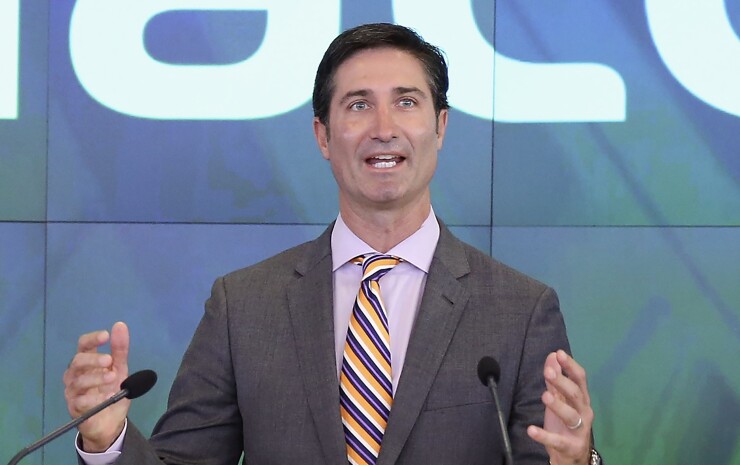
Starbucks on Tuesday said Niccol would succeed Laxman Narasimhan, who is leaving the coffee chain's top job. Niccol will assume the role on Sept. 9, with current CFO Rachel Ruggeri serving as interim CEO.
Niccol's tasks will include boosting digital payments and mobile commerce, which has become more competitive than in the early days of mobile apps when Starbucks took a quick lead in using the technology. The Seattle-based coffee retailer has reaped numerous benefits from customers' use of its app to
"Starbucks indeed was one of the early movers in mobile payments, but it wasn't so much about payment and more about building a customer relationship management model," Crone said. "They were the first mover in using payment registration with its own app in order to make their customers known and contactable and deep."
That has given Starbucks an advantage in the large prepaid balances of its consumers, which are comparable or higher than the total deposits of about 80% of community banks and credit unions, according to research from Crone's consulting firm.
"Once the money gets from Apple Pay or Google Pay or PayPal or Venmo into [Starbucks'] app, it can only be spent at their store," Crone said.
Crone Consulting estimates that two-thirds of the funding for Starbucks' prepaid balances come from digital wallets, so if a bank and credit union doesn't support these wallets, they will not earn interchange fees from the initial funding or the subsequent Starbucks' purchases.
"Plus, [Starbucks] benefited from the cash management value of holding those funds on their balance sheet, not in the consumer's account, not on the bank's balance sheet," Crone said.
Still, the growth of digital wallets leaves plenty of room for innovation in Starbucks' payment business, said Aaron McPherson, principal at AMF Consulting, noting that while Starbucks was one of the first retail chains to adopt mobile payments at scale, new developments such as general purpose digital wallets have gained ground. Some merchants, such as Walgreens and CVS, already integrate with digital wallets to allow consumers to see rewards balances in their wallet, he said.
"You don't get any extra points for paying at Starbucks with Apple Pay or Google Pay, and their offers are pretty much all inside the app," McPherson said. "I think that's an opportunity for [Starbucks] to try to reach people who just want to pay, or some people that prefer the in-person experience."
Niccol is well-positioned to continue to capitalize on Starbucks' payment success, said Sankar Krishnan, executive vice president for banking and capital markets at Capgemini.
"I would say [Starbucks] is one of the world's greatest examples of a digital wallet that is doing exceedingly well, and I think that's only expected to continue and grow with the new CEO, because he has done such an amazing job at Chipotle driving the retail revolution," Krishnan said.
For example, Chipotle under Niccol's leadership launched an in-app chatbot and built out tracking for individual consumer preferences. "Every metric on food and fast-moving food, Chipotle has hit out of the park," Krishnan said.
Starbucks Mobile Order and Pay (MOP) revenue for the quarter ending June 30 was up 10% year over year, and the number of MOP transactions increased 7% year over year, former CEO Narasimhan said on the company's latest earnings call.
As Starbucks opens more stores in high-traffic locations, its ability to embed mobile payments with marketing and other features will improve, Krishnan said: "[Starbucks' payments] are going to get significantly stronger."






